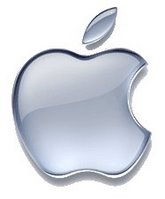
One of the first tasks with little Mac Mini was to get iTunes shifted across from the PC and working on the Mac.
What a palaver! Thank goodness English has such a good word to adequately describe the task.
Apple in their wisdom* don’t make it easy to get an iTunes installation across from Windows to one of their white aluminium Macs. It’s not as simple as just copying the folders across from the PC, maybe putting them on a USB key or a removable drive ... though a quick Google search will pick up some tedious instructions that explain how to alter the .xml file etc if you want to hack it across by hand.
No, the official method is to backup your iTunes library onto CD or DVD. iTunes’ File -> Back Up to Disk is constrained to media that you burn. Great if you want to transfer your collection between continents. But somewhat slower than the speed of light to get your songs and podcasts across your desk.
*in a half understandable attempt to increase security and reduce copytheft by making the copy process slow and costly
Like quite a lot of other user who are reporting problems online at the moment, the third DVD failed during the write process. Twice. That’s six DVD-R’s wasted.
Turns out the 4251 error is probably caused by the virus checking software taking too long to scan a large file (in this case it was a video file), which consequently disrupts the burn process. Disabling the virus checker for the duration of the burn allowed the next burn cycle to complete successfully (and somewhat faster too).
Transferring the iTunes collection across to the Mac was then as simple as running up iTunes and popping the DVDs into the Mac in order. They’re automatically detected, and iTunes offers to import the files it finds
That leaves podcasts. Your subscriptions aren’t copied across – though any podcast files are. So you need to go to the podcasts folder in the iTunes library, and use File -> Export to save the Podcast subscription file (*.opml). Then copy it across to the Mac (USB key will do) and File -> Import it. Note that any podcast you’ve already downloaded on the PC, listened to, and deleted will now be re-downloaded, so you’ll want to delete a lot those entries before they start! Why didn’t Apple properly support podcast downloads in their backup feature.
Don’t forget to log into iTunes under your account, and authorise the new Mac – and if necessary deauthorise the PC. You can have up to five machines authorised under your account.
Having checked the number of songs and podcasts on the Mac versus the PC original and found them to match up, I plugged in my iPod. It recognised it, and could show the contents, but couldn’t do an automatic synchronise with the Mac since the iPod was Windows formatted (FAT32). So had to use iTunes to restore the factory settings to the iPod, and then synchronise from scratch.
What a palaver!
I’m typing this up on Mac – using Microsoft’s free (beta) Remote Desktop Connector to get back to the PC. Cheating really, but it’s a quick way to access Windows, albeit in an 800x600 window. But nice to have the Home, End and Ctrl-arrow keys working as expected again. Update: found the preferences to move the resolution back up to something more credible.























